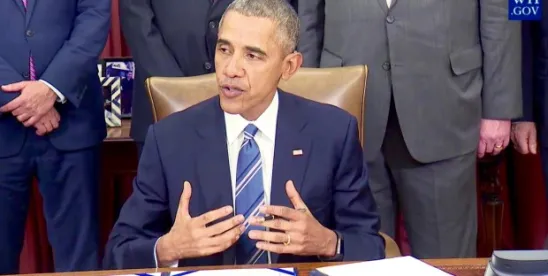On January 13, 2017, President Barack Obama signed an Executive Order (the “Sudan Executive Order”) that will effectively revoke, after six months (i.e., on July 12, 2017), the U.S. trade embargo against Sudan, provided the Government of Sudan continues recent humanitarian improvements and reductions in military and hostile activity. Simultaneously with the Sudan Executive Order, the U.S. Department of the Treasury’s Office of Foreign Assets Control (“OFAC”) issued a Final Rule to amend the Sudanese Sanctions Regulations (31 CFR Part 538; “SSR”), which implements the Sudan sanctions, to include a general license effective January 17, 2017, that authorizes all previously prohibited transactions with Sudan and the Government of Sudan, with certain limitations. Additionally, the Department of Commerce’s Bureau of Industry and Security (“BIS”), which enforces the Export Administration Regulations (15 CFR Part 730 et seq.; “EAR”), issued a Notice easing its policy of review for certain EAR license applications for Sudan.
The Executive Order
U.S. sanctions against Sudan were originally established nearly 20 years ago by Executive Order 13067 (November 3, 1997), and further enhanced by Executive Order 13412 (October 13, 2006), as a reaction to the Sudanese Government’s destabilizing activities, support for terrorism and human rights violations, including in the Darfur region. The sanctions imposed a comprehensive embargo, with limited exceptions, on trade from the United States or by “U.S. Persons” involving Sudan, and blocked the property and interests in property of the Government of Sudan.
The new Sudan Executive Order, noting “positive actions” recently taken by Sudan including “a marked reduction in offensive military activity, culminating in a pledge to maintain a cessation of hostilities in conflict areas in Sudan, and steps toward the improvement of humanitarian access throughout Sudan, as well as cooperation with the United States on addressing regional conflicts and the threat of terrorism,” provides for the revocation of Executive Orders 13067 and 13412 effective July 12, 2017, assuming Sudan maintains these positive actions. (The revocation of these Executive Orders will result in termination of the SSR.) The decision whether to revoke the sanctions will depend upon an assessment to be conducted by the Secretary of State, in coordination with the Secretary of the Treasury, the Director of National Intelligence, and the Administrator of the U.S. Agency for International Development.
The Sudanese Sanction Regulations
In conjunction with the Sudan Executive Order, OFAC has amended the SSR by adding a general license at 31 CFR § 538.540 that authorizes “U.S. Persons” to engage in all transactions previously prohibited by the SSR and Executive Orders 13067 and 13412, and the unblocking of property of the Government of Sudan that was previously subject to blocking. (For purposes of the SSR, a “U.S. Person” includes any U.S. citizen or permanent resident (i.e., a “green card” holder) wherever located or employed globally, any entity that is established under the laws of the United States or any U.S. jurisdiction or located in the United States, and any foreign person while in the United States.) OFAC has also issued a Fact Sheet describing these changes and has revised and updated Frequently Asked Questions regarding the Sudan sanctions program.
According to the Final Rule, transactions that are now permitted include the “processing of transactions involving persons in Sudan; the importation of goods and services from Sudan; the exportation of goods, technology, and services to Sudan; and transactions involving property in which the Government of Sudan has an interest.” Authorized activity also includes all trade between the United States and Sudan that was previously prohibited by the SSR, all transactions by U.S. Persons relating to the petroleum or petrochemical industries in Sudan that were previously prohibited by the SSR (including oilfield services and oil and gas pipelines), and the facilitation of Sudan-related transactions by U.S. Persons. Additionally, U.S. Persons are no longer prohibited from engaging in transactions with persons designated as Specially Designated Nationals (“SDNs”) under the SSR (these are persons designated with the [SUDAN] program tag on the OFAC-administered SDN List).
Finally, any transactions with Sudan that were being conducted pursuant to OFAC general licenses can now continue without regard to any requirements for the use of those licenses. However, note that medicines, medical devices, and agricultural commodities that were authorized for export to Sudan under the Trade Sanctions Reform and Export Enhancement Act of 2000 (“TSRA”) must still be shipped within a 12-month period starting on the date of signing of the relevant contract for sale/shipment. (This restriction remains because it is set forth in the TSRA, which has not been amended by these latest actions.)
Change to BIS Licensing Policy
Concurrently with the Sudan Executive Order and OFAC Final Rule, BIS published a Notice in the Federal Register revising its policy regarding applications for licenses to export or reexport to Sudan the following items that are subject to the jurisdiction of the EAR:
-
Items intended to ensure the safety of civil aviation or the safe operation of fixed-wing, commercial passenger aircraft; and
-
Items for use to inspect, design, construct, operate, improve, maintain, repair, overhaul, or refurbish railroads.
BIS has indicated that it will now apply a general policy of approval of applications for these items. It appears that license applications for the export or reexport to Sudan of any other EAR items requiring a BIS license for Sudan will still be subject to a general policy of denial.
Continuing Restrictions and Requirements
Notably, these changes do not impact other OFAC sanctions programs, including the Darfur, South Sudan, terrorism, and non-proliferation sanctions programs and the bar on dealings with any persons in Sudan designated under those other programs, which still apply fully to U.S. Persons and transactions from the United States. As such, any Sudan transactions should be carefully screened for parties that are designated on the SDN List under other OFAC sanctions programs. The changes will also not affect any past, present, or future OFAC enforcement investigations or actions related to alleged or apparent violations of the SSR.
Additionally, except for the licensing policy change discussed above, BIS has not announced any relaxation of the controls on the export and reexport of EAR items it administers with respect to Sudan. While items classified as “EAR99” under the EAR’s Commerce Control List (15 CFR Part 774 Supp 1; “CCL”) will not be restricted for export or reexport to Sudan, authorization will still be required for export or reexport of any EAR items described on the CCL, including items controlled only for antiterrorism reasons. Foreign-produced items exported to Sudan that incorporate U.S. content will also remain subject to the 10% de minimis test for controlled U.S. content, rather than the 25% de minimis test for most other destinations.
Finally, it should be noted that, for now, Sudan retains its official designation by the State Department as a state sponsor of terrorism. As such, for companies with securities registered in the United States, transactions with Sudan will likely continue to come under enhanced securities disclosure requirements, as administered by the U.S. Securities and Exchange Commission’s Office of Global Security Risk.
Impact on Non-U.S. Persons
While non-U.S. Persons are not subject to the SSR, they were effectively unable to order EAR99 items from the United States or a U.S. Person specifically or predominantly for Sudan due to the prior prohibition applicable to U.S. Persons. That prohibition is no longer is in effect, which will open up possibilities for non-U.S. Persons to order and procure EAR99 items from the United States and U.S. Persons for the Sudan market and in support of Sudanese operations. Note that non-EAR99 items (e.g., items described on the CCL) are still restricted and, due to the extraterritorial application of the EAR, non-U.S. Persons shipping those items to Sudan without BIS authorization would be a direct breach of the EAR.
Practical Takeaways
Pursuant to the six-month delay incorporated in the Sudan Executive Order, the final lifting of the Sudan embargo (and, even in the interim, the continued existence of the general license permitting current transactions) will ultimately be subject to the Trump Administration’s position on the embargo. Of course, even without the change in Administration, because the current lifting of the embargo is only tentative, any transaction involving Sudan, including investment activities, should be pursued with care and with all available contractual protections.




 />i
/>i

